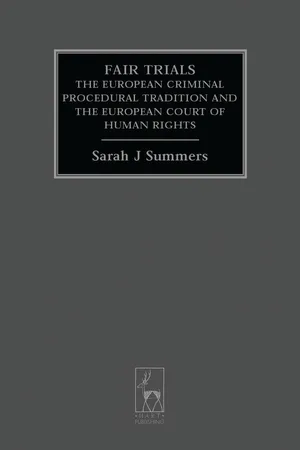
Fair Trials
The European Criminal Procedural Tradition and the European Court of Human Rights
- 200 pages
- English
- PDF
- Available on iOS & Android
Fair Trials
The European Criminal Procedural Tradition and the European Court of Human Rights
About this book
The right to a fair trial has become an issue of increasing public concern, following a series of high profile cases such as the Bulger case, Khan (Sultan) and R v DPP ex p Kebilene. In determining the scope of the right, we now increasingly look to the ECHR, but the court has given little guidance, focusing on reconciling procedural rules rather than addressing the broader issues. This book addresses the issue of the meaning of the right by examining the contemporary jurisprudence in the light of a body of historical literature which discusses criminal procedure in a European context. It argues that there is in fact a European criminal procedural tradition which has been neglected in contemporary discussions, and that an understanding of this tradition might illuminate the discussion of fair trial in the contemporary jurisprudence.
This challenging new work elucidates the meaning of the fair trial and in doing so challenges the conventional approach to the analysis of criminal procedure as based on the distinction between adversarial and inquisitorial procedural systems. The book is divided into two parts. The first part is dominated by an examination of the fair trial principles in the works of several notable European jurists of the nineteenth century, arguing that their writings were instrumental in the development of the principles underlying the modern conception of criminal proceedings. The second part looks at the fair trials jurisprudence of the ECHR and it is suggested that although the Court has neglected the European tradition, the jurisprudence has nevertheless been influenced, albeit unconsciously, by the institutional principles developed in the nineteenth century.
Frequently asked questions
- Essential is ideal for learners and professionals who enjoy exploring a wide range of subjects. Access the Essential Library with 800,000+ trusted titles and best-sellers across business, personal growth, and the humanities. Includes unlimited reading time and Standard Read Aloud voice.
- Complete: Perfect for advanced learners and researchers needing full, unrestricted access. Unlock 1.4M+ books across hundreds of subjects, including academic and specialized titles. The Complete Plan also includes advanced features like Premium Read Aloud and Research Assistant.
Please note we cannot support devices running on iOS 13 and Android 7 or earlier. Learn more about using the app.
Information
Table of contents
- Acknowledgments
- Contents
- Tables of Cases
- Introduction
- Part One
- 1The Enduring Legacy of‘Inquisitorial’ and ‘Accusatorial’Procedural Forms in the Debate onComparative Criminal Procedure
- A The Enduring Legacy of theInquisitorial/Accusatorial Divide
- B The Connection to Legal Nationalism
- C Developing a New Approach for AnalysingEuropean Criminal Procedure Law
- 2The Origins of the EuropeanCriminal Procedural Tradition
- A The Importance of the Developments of theNineteenth Century
- B The Development of the ‘Accusatorial Trinity’
- C Judicial Impartiality
- D The Public Hearing Requirement
- E Immediate and Oral Proceedings
- F Conclusions
- 3The Rights of the Defence: Lessonsfrom the Nineteenth Century
- A The Institutional Nature of the ‘Rights of theAccused’
- B The Rights of the Defence at Trial
- C The Role of the Defence in the Pre-trial Phase
- D Conclusions
- Part Two
- 4Defining Fairness in Article 6(1)ECHR
- A Introduction
- B Identifying Vargha’s ‘Accusatorial Trinity’
- C The Role of the ‘Equality of Arms’ Doctrine
- D The Relationship Between the AdversarialProcedure Requirement and the Equality of Arms
- E The Court’s Interpretation of the AdversarialProcedure Requirement in Criminal Proceedings
- F The Relationship Between the Defence and theProsecution
- G Fairness and Implied Procedural Forms
- 5The Structure of the ‘Trial’ in Article6 ECHR
- A Introduction
- B The Defence’s Right to Challenge Witness Evidence
- C Witness Evidence in Europe: An Overview
- D Regulating Witness Evidence: Article 6(3)(d)
- E The Importance of the Trial as a Forum forConfronting Witness Evidence
- F Reconciling Examination of Witnesses in theInvestigation Phase with the ‘Accusatorial Trinity’
- G The Privilege Against Self-incrimination
- H The Root of the Problem: Defining the ‘Trial’
- 6Reassessing Fairness in EuropeanCriminal Law: Procedural Fairness,Individual Rights and InstitutionalForms
- A Procedural Fairness as Individual Rights
- B Procedural Rights and Institutional Forms
- C Article 6 ECHR and the European CriminalProcedural Tradition
- D Towards an Institutional Understanding ofFairness in Criminal Proceedings
- Index